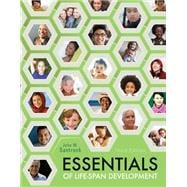Why are you assigning or considering a brief Human Development text? Is it because your students do not complete the reading in a comprehensive text? Do you run out of time trying to cover the entire lifespan over the course of a few months? Do your students struggle to retain the sheer volume of information in the course? Instructors across the country, looking for a streamlined text that captures the core concepts of life-span development are excited for John Santrock's Essentials of Life-Span Development, 3e.
Essentials of Life-Span Development 3e was developed to help meet the ever-changing needs of students in the lifespan course. Knowing that students do not often read the text and have poor study skills, Essentials introduces LearnSmart, McGraw-Hill's adaptive study tool, that helps students know what they know, and more importantly what they don’t know, to become more efficient and effective learners.
Based on hallmark features: its expert contributors, updated research, and focus on applications, Santrock provides the most dependable and current presentation of life-span development available, and he does so in a briefer format with LearnSmart, helping to ensure that your students will read and appreciate the material while seeing the applications to their everyday life. McGraw-Hill's new Milestones video and assessment program helps bring the course material to life, so your students can witness development as it unfolds.
